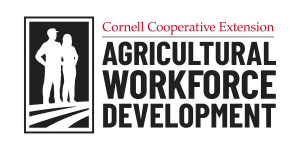New York’s Agricultural Workforce Development Council is hosting a webinar for all farm employees. See notice in English and Spanish below. Employers are asked to set up the webinar in breakrooms and meeting areas to help employees gain access.
Upcoming Webinar: Union Basics for Farm Employees in Spanish
Wednesday, May 17, 12 PM – 1:30 PM
Union organizers are aggressively contacting farm employees all across New York. Many farm employees are unfamiliar with unions and not sure what to do. New York’s Ag Workforce Development Council will host Dr. Bob Ceglowski, consulting veterinarian and trusted advisor to dairy employees and managers, to discuss farm unions in a webinar delivered in Spanish. Topics will include: what unions are, the meaning and obligation of signing a union card, why farm employees may or may not want a union, and clarifying rumors and misinformation that are currently circulating in the farm community.
Attendees will receive the link to join the webinar after they have registered.
Register in advance for this webinar:
https://us06web.zoom.us/webinar/register/WN_qW9QZTHBTk6gkU7CBMpd-A
Una Sesión Virtual en Español: Sobre los Conceptos Básicos de los Sindicatos Para los Trabajadores Agrícolas
Miércoles, 17 de mayo, 12 PM – 1:30 PM
Los representantes sindicales están contactando agresivamente a los empleados agrícolas en toda Nueva York. Muchos de los trabajadores no están familiarizados con los sindicatos y no están seguros de qué hacer. El Consejo de Desarrollo de la Fuerza Laboral Agrícola de Nueva York dará una sesión virtual en español presentado por el Dr. Bob Ceglowski, un veterinario y consultor profesional que tiene la confianza de los empleados y supervisores de las lecherías. Los temas incluirán: qué son los sindicatos, el significado y la obligación de firmar una tarjeta de afiliación sindical, cuál es la razón por la cual los trabajadores querrán o no querrán tener la representación de un sindicato y va a haber la oportunidad de aclarar los rumores y la información errónea que está circulando ahora en la comunidad agrícola.
Todos los participantes recibirán el enlace para unirse a la sesión virtual después de que se hayan registrado.
Regístrese ahora para esta sesión virtual aquí:
https://us06web.zoom.us/webinar/register/WN_qW9QZTHBTk6gkU7CBMpd-A

